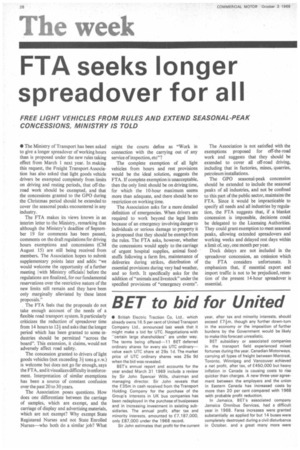FTA seeks longer spreadover for all
Page 30

If you've noticed an error in this article please click here to report it so we can fix it.
FREE LIGHT VEHICLES FROM RULES AND EXTEND SEASONAL-PEAK CONCESSIONS, MINISTRY IS TOLD
• The Ministry of Transport has been asked to give a longer spreadover of working hours than is proposed under the new rules taking effect from March 1 next year. In making this request, the Freight Transport Association has also asked that light goods vehicle drivers be exempted completely from limits on driving and resting periods, that off-theroad work should be exempted, and that the concessions granted to the GPO during the Christmas period should be extended to cover the seasonal peaks encountered in any industry.
The FTA makes its views known in an interim letter to the Ministry, remarking that although the Ministry's deadline of September 19 for comments has been passed, comments on the draft regulations for driving hours exemptions and concessions (CM August 15) are still being received from members. The Association hopes to submit supplementary points later and adds: "we would welcome the opportunity of a further meeting [ with Ministry officials] before the regulations are finalized, for our fundamental reservations over the restrictive nature of the new limits still remain and they have been only marginally alleviated by these latest proposals."
The FTA feels that the proposals do not take enough account of the needs of a flexible road transport system. It particularly criticizes the reduction of spreadover time from 14 hours to 12f and asks that the longer period which has been granted to some industries should be permitted "across the board". This extension, it claims, would not adversely affect road safety.
The concession granted to drivers of light goods vehicles (not exceeding 3+ tons g.v.w.) is welcome but does not go far enough, says the FTA, and it visualizes difficulty in enforcement. Interpretation of similar exemptions has been a source of constant confusion over the past 20 to 30 years.
The Association poses questions. How does one differentiate between the carriage of samples, which are exempt, and the carriage of display and advertising materials, which are not exempt? Why exempt State Registered Nurses and not State Enrolled Nurses—who both do a similar job? What might the courts define as "Work in connection with the carrying out of any service of inspection, etc"?
The complete exemption of all light vehicles from hours and rest provisions would be the ideal solution, suggests the FTA. If complete exemption is unacceptable, then the only limit should be on driving time, for which the 10-hour maximum seems more than adequate, and there should be no restriction on working time.
The Association asks for a more detailed definition of emergencies. When drivers are required to work beyond the legal limits because of an emergency involving danger to individuals or serious damage to property it is proposed that they should be exempt from the rules. The FTA asks, however, whether the concessions would apply to the carriage of urgent hospital supplies, animal foodstuffs following a farm fire, maintenance of deliveries during strikes, distribution of essential provisions during very bad weather, and so forth. It specifically asks for the addition of "animals and livestock" under the specified provisions of "emergency events". The Association is not satisfied with the exemptions proposed for off-the-road work and suggests that they should be extended to cover all off-road driving, including that in factories, mines, quarries, petroleum installations.
The GPO seasonal-peak concession should be extended to include the seasonal peaks of all industries, and not be confined to this part of the public sector, maintains the FTA. Since it would be impracticable to specify all needs and all industries by regulation, the FTA suggests that if a blanket cOncession is impossible, decisions could be delegated to the Licensing Authorities. They could grant exemption to meet seasonal peaks, allowing extended spreadovers and working weeks and delayed rest days within a limit of, say, one month per year.
Dock delays are not included in the spreadover concession, an omission which the FTA considers unfortunate. It emphasizes that, if essential export and import traffic is not to be prejudiced, retention of the present 14-hour spreadover is essential.




































































































































